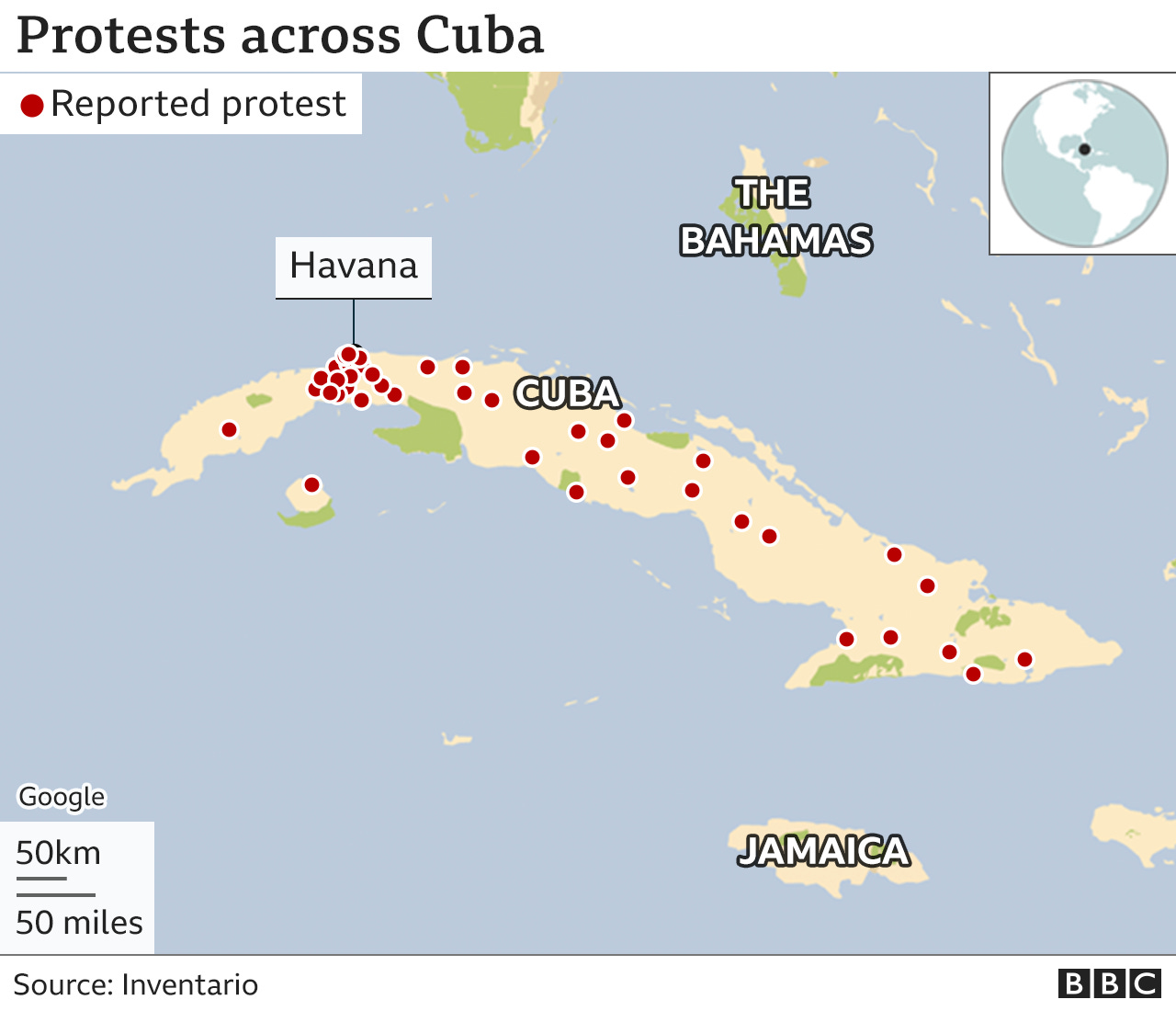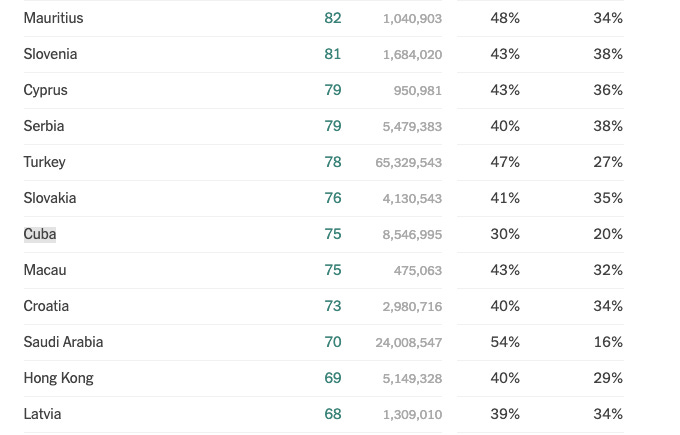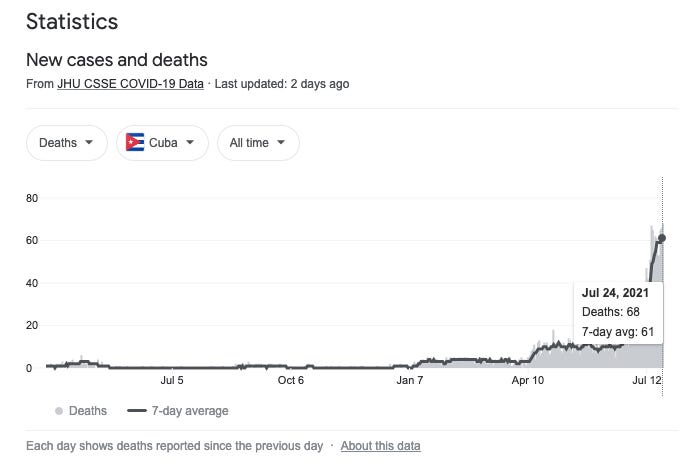With unprecedented levels of protest gripping the Caribbean island-nation in a post-Castro pandemic era, there is a growing cloud of uncertainty over what its future will hold.
Rebellion is shaking Cuba to its core these days. Many Cubans on the isolated Communist-run island appear exhausted from one-party government. As a mix of pandemic, economic devastation, food shortages and continued diplomatic isolation continue to wreck the Caribbean nation, many Cuban citizens are putting up a major protest fight. That’s caused a recent and rather vicious response from the government and military. In response, the Biden administration also recently announced a fresh round of sanctions on the Cuban government (on top of sanctions that have already been in place since 1962)
Intimidation and threats from the island nation’s government have escalated, prompting further uprising and demands for the resignation of current president Miguel Diaz-Canel. With everyday Cubans expressing exhaustion from increasingly precarious conditions under a repressive one-party regime – as they barely make ends meet for survival – there is a cloud of uncertainty in Cuba that some observers suggest feels different from past periods. That’s also manifested into the creation of broader, global hashtag movements like #SOCcuba, a digital cry for help that may be resonating.
There have been over two dozen protests in Cuba in recent weeks, with most centered in the nation’s capitol of Havana.

Hundreds have been arrested and nearly 60 have been prosecuted in the wake of growing unrest. “Until yesterday, 19 judicial processes had reached the municipal courts of the country – cases involving 59 people accused of committing alleged crimes (during) these disturbances,” Cuban Supreme Court president Ruben Remigio Ferro recently announced. Meanwhile, there have been numerous reports of Internet blackouts and others of government-hired hit men sent to attack any protestors or to conduct searches for opposition leaders. President Díaz-Canel is claiming the protesters are “mercenaries” hired by the U.S. in an effort to destabilize Cuba. “The order to fight has been given – into the street, revolutionaries!” was the latest announcement from Diaz-Canel as he’s now pitting government supporters against protesters.
One other wrinkle not covered as much in most media coverage is how recent protest and unrest in Cuba is being driven by louder calls from the island’s massive Black population for racial justice. Estimates of the Black/African-descent population in Cuba plus those of mixed-heritage put it at, perhaps, two-thirds of the population. Yet, as columnist Charles Lane explains in the Washington Post, there are huge racial inequalities in Cuba that are being spotlighted in the latest round of instability.
Yet contained within them — indeed, at their forefront — are the special grievances of Black people in a country where enslaved Africans were first brought during Spanish colonial times, followed in the 20th century by Caribbean laborers such as the Haitians who were exploited by Angel Castro, Fidel and Raúl Castro’s father, on his vast estate.
Afro-Cubans are less likely to have relatives abroad than White Cubans; few get dollar remittances to purchase goods in Cuba’s warped, state-run economy. A survey of 1,049 Cubans by Katrin Hansing of Baruch College and Bert Hoffman of the GIGA Institute of Latin American Studies, completed in 2018, found that 95 percent of self-identified Black Cubans have less than $3,000 in income, and essentially none are in the island’s top economic strata. The island’s tourist facilities notoriously prefer to hire Whites.
The Cuban government’s response has triggered international outrage, including sanctions, as observers are worried the voice of Cubans are being silenced while any protestors left are at risk of punishment.
Currently, the two most populated island nations in the Caribbean region, Cuba and Haiti, are facing dangerous levels of instability. Combined, these two nations represent nearly 23 million people. The recent assassination of Haiti’s president could present a new, unwanted twist to Cuba’s situation as events unfold.
Food shortages and health care have been major issues for the people of Cuba. Food imports are portioned evenly enough to last up to a month for each household, but economic challenges have caused widespread food and pharmacy scarcity. Stores that do have food are charging through U.S. currency – which a majority of Cubans do not have, especially since the Biden administration put a halt on popular remittance payments from families and organizations in the U.S. to Cuban residents. On top of food shortages COVID-19 has played an increasingly troubling role in this as infections are on the rise. The Biden administration has promised a large humanitarian vaccine shipment to Cuba, but only on the condition that an impartial international organization can administer it.
Many Cubans are being denied healthcare in hospitals as demands for vaccines are increasing: at the moment, just 20 percent of Cuban residents are fully vaccinated.

Many of the nation’s health care workers were deployed to other countries during the pandemic – part of Cuba’s decades long policy of medical diplomacy. That move has left the government unable to adequately respond to the current pandemic emergency as COVID-19 death rates in Cuba increase.

